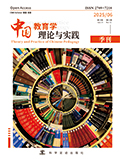参考文献
[1] Cecilie Skaalvik. School principal self-efficacy for in- structional leadership: relations with engagement, emotional exhaustion and motivation to quit[J]. Social Psychology of Education, 2020, 23(23): 479-498.

